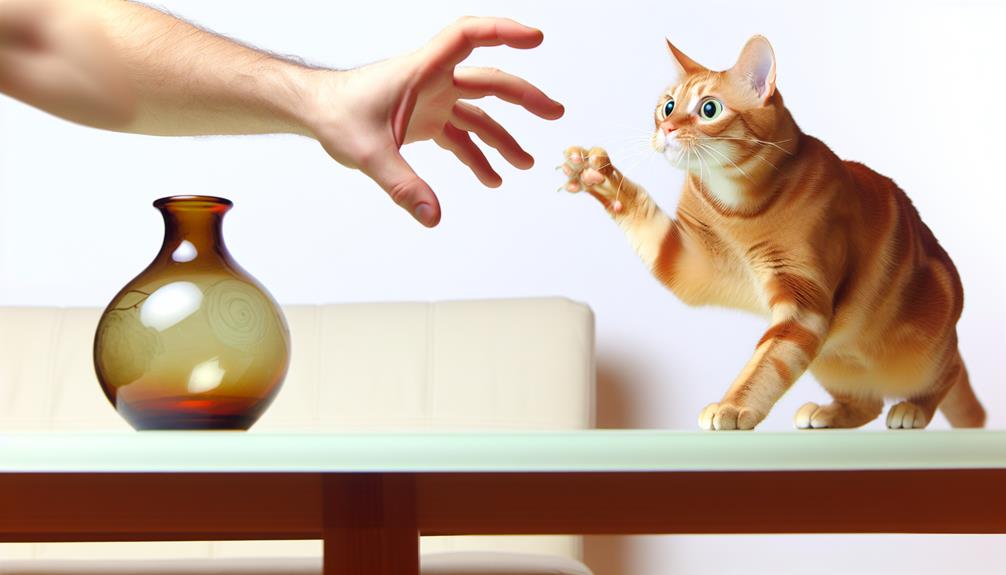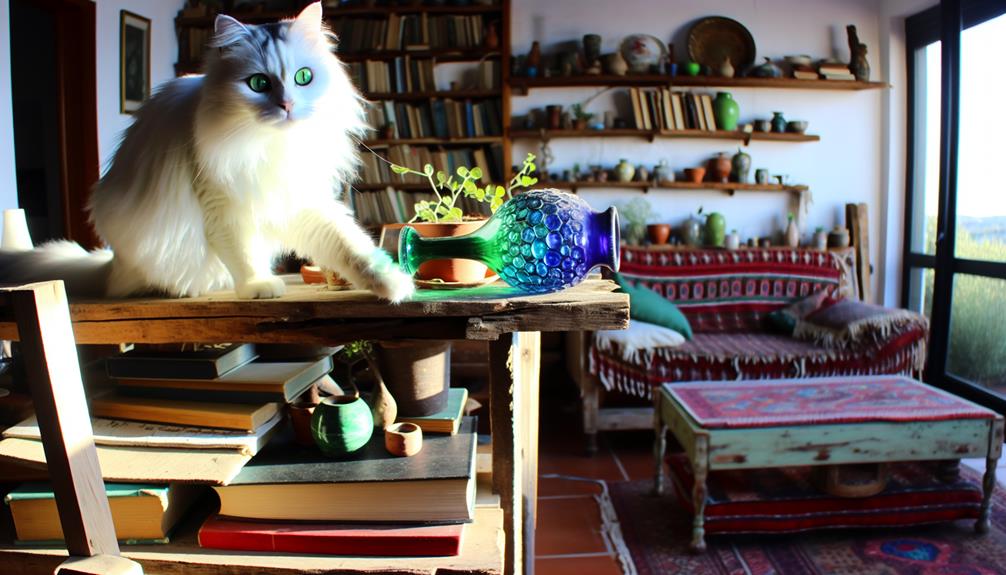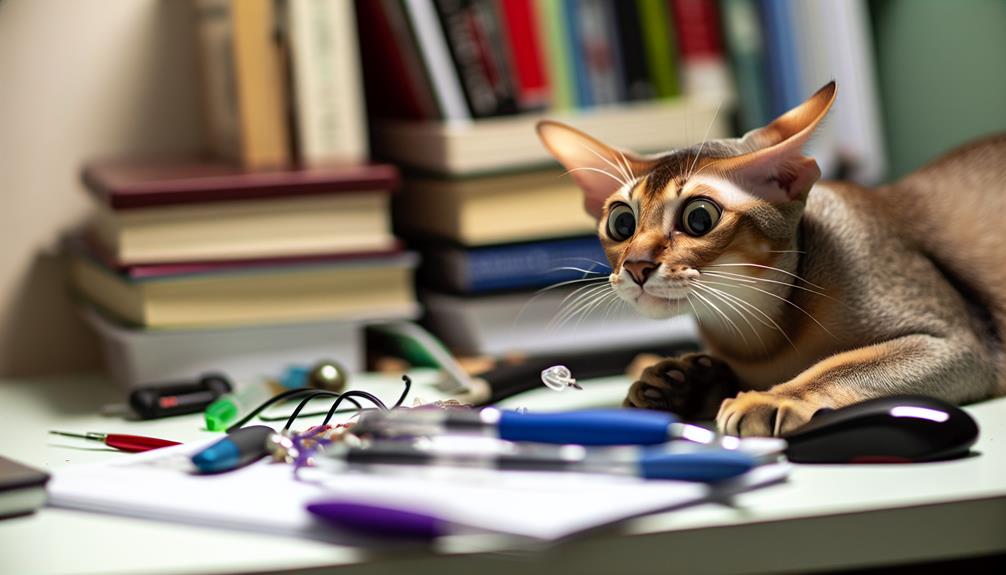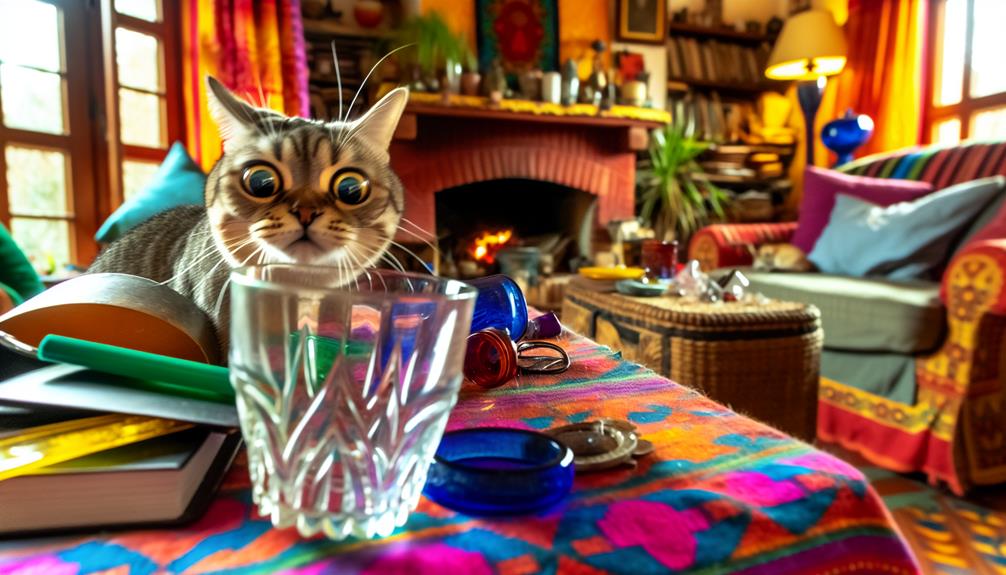Have you ever wondered why your cat seems to find joy in knocking things off tables and shelves? It's a behavior that might leave you puzzled, but there's a range of interesting reasons behind it. Cats are natural hunters, and pawing at objects can mimic the actions they'd use to catch prey. This behavior is also a method of exploring their environment, gathering sensory information. Sometimes, it's simply a call for your attention or a cure for their boredom. Understanding these motivations can help you create a more enriching space for your feline friend.
Hunting Instincts
Cats knocking things over can often be traced back to their inherent hunting instincts. When you observe a cat batting at objects, you're witnessing a manifestation of their predatory behavior. In the wild, cats are natural hunters, and their survival depends on detecting and capturing prey. This behavior remains hardwired in domesticated cats, even though they may no longer need to hunt for food.
Your cat's actions can be linked to their need to simulate hunting scenarios. By pawing at objects, they're honing their skills, refining their motor coordination, and maintaining their mental sharpness. This activity mimics the motions of swatting at prey, testing its movement and ensuring it's safe to approach. When they knock things over, they're fundamentally practicing their predatory techniques.
Feline instincts also drive this behavior. Cats are equipped with highly sensitive paws, capable of detecting minute vibrations and textures. When they encounter an object, their natural curiosity is piqued, and they may use their paws to explore it. This investigative approach helps them gather information and assess potential threats or opportunities, much like they would in their natural habitat.
Additionally, the act of knocking things over can provide sensory enrichment. The sound and movement of falling objects can stimulate a cat's senses, providing mental and physical stimulation. This can be particularly important for indoor cats, who may lack other outlets for expressing their predatory behavior.
Understanding that your cat's actions are rooted in their hunting instincts can help you provide appropriate outlets for their behavior. Interactive toys and play sessions can offer a constructive way for them to channel their natural predatory tendencies.
Curiosity
You might notice your cat knocking things over as a way to explore new objects in their environment. This behavior also allows them to test the reactions of these objects, satisfying their innate curiosity. Understanding this can help you better manage their natural investigative tendencies.
Exploring New Objects
When encountering new objects, felines often exhibit an inquisitive nature driven by their instinctual need to explore and understand their environment. This behavior is fundamentally rooted in their sensory exploration and desire for new object interactions. Cats use their paws and noses to investigate unfamiliar items, relying heavily on their heightened senses to gather information.
You might observe your cat engaging in the following behaviors when a new object is introduced:
- Sniffing: Cats use their powerful sense of smell to identify the object, determine if it's familiar, and assess any potential threats.
- Touching with paws: By batting or gently tapping the object, cats can gauge its texture, weight, and stability.
- Listening: Cats' acute hearing allows them to detect any sounds the object might make, providing additional context about its nature.
- Visual inspection: Cats rely on their sharp vision to further scrutinize the object, noting its shape, color, and movement.
These new object interactions are vital for felines as they navigate their surroundings. By engaging in sensory exploration, cats can satisfy their curiosity and guarantee their environment is safe. Each interaction helps them build a mental map of their territory, which is essential for their overall well-being.
Testing Object Reactions
A fascinating aspect of feline behavior is their propensity for testing object reactions out of sheer curiosity. Cats are naturally inquisitive creatures, and their object interactions often serve to satisfy this curiosity. When your cat knocks something over, it's not just random mischief; they're gathering information about their environment. This behavior is rooted in their instinctual need to understand the physical properties and stability of objects around them.
In scientific terms, this is known as exploratory behavior. By pawing at items or pushing them off surfaces, cats are evaluating factors such as weight, texture, and the object's reaction to force. These interactions provide sensory feedback that aids in their spatial awareness and environmental understanding. Fundamentally, your cat is conducting a mini-experiment every time they swipe something off a table.
Moreover, this behavior can be linked to a cat's hunting instincts. In the wild, felines often test the movement of potential prey. While your indoor cat isn't hunting for survival, the same instinctual drives influence their interactions with household objects. Understanding this aspect of feline behavior can help you manage and even anticipate your pet's actions.
Attention Seeking

Often, a cat's penchant for knocking objects off surfaces can be attributed to attention-seeking behavior. When your feline companion feels neglected or ignored, it may resort to dramatic actions to capture your focus. This form of cat behavior is a nuanced aspect of feline communication, reflecting their need for social interaction and mental stimulation.
Cats are astute observers of their human companions. They quickly learn that their actions can elicit a response from you. When they knock over an item and you rush over, they achieve their goal: your undivided attention. This behavior can be particularly pronounced in indoor cats who may not receive sufficient stimulation throughout the day.
Here are some reasons why your cat might be engaging in this attention-seeking behavior:
- Boredom: Cats require mental and physical stimulation. Without enough play or interaction, they may create their own excitement.
- Hunger: If their feeding schedule is off or they're hungry, they may knock things over to prompt you to fill their bowl.
- Loneliness: Cats are social creatures. When they feel lonely, they might act out to get some company.
- Reinforcement: If you've previously responded to this behavior by giving them attention, they learn to repeat it to get the same result.
Understanding the underlying motivations behind your cat's actions can help you address their needs more effectively. By providing adequate mental stimulation and social interaction, you can mitigate this attention-seeking behavior. Keeping a consistent feeding schedule and spending quality time with your cat can also reduce their need to resort to knocking things over to get your attention.
Playfulness
During moments of playfulness, cats may knock things over as part of their natural predatory instincts. This cat behavior is deeply rooted in their evolutionary history as hunters. In the wild, felines hone their hunting skills through playful antics that mimic the stalking and capturing of prey. When your cat engages in these play techniques, it's fundamentally practicing the same behaviors that would be essential for survival in the wild.
Feline interaction often involves mock hunting, where a cat might bat at objects, pounce on toys, or even knock items off shelves. This object engagement is a form of playful predation, allowing your cat to simulate the capture and subduing of prey. Social play with other cats or even with humans can also involve these behaviors, as cats use their paws to manipulate objects and engage in mock battles.
Environmental enrichment is critical for a cat's well-being, and interactive play can help satisfy their predatory instincts. Providing a variety of toys can help redirect your cat's playful energy away from household items. Toys that mimic the movement of prey can be particularly effective in engaging your cat in a manner that satisfies their hunting drive.
In addition, rotating the types of toys and introducing new ones can keep your cat mentally stimulated and reduce the likelihood of them turning to household objects for entertainment. By understanding the role of play in cat behavior, you can create a more enriching environment that caters to your feline friend's natural instincts, thereby reducing the incidence of objects being knocked over.
Testing Gravity

When observing your cat's behavior, you may notice them knocking objects off surfaces as if they were testing gravity. This seemingly mischievous action can actually be rooted in a cat's curiosity and their keen sense of gravity perception. By engaging in this peculiar activity, cats are exploring and understanding the physical world around them.
Feline behavior often reflects an intrinsic need to investigate their environment. Knocking things over is a way for cats to test the stability and behavior of objects in their surroundings. This action provides them with immediate sensory feedback, helping them gauge how objects react to gravity. Cats, being natural-born hunters, rely on their acute sensory perception to navigate and interact with their habitat, and understanding gravity is an essential part of this navigation.
Consider these points when thinking about why your cat might be knocking things over:
- Curiosity: Cats are inherently curious creatures that explore their environment to learn more about it.
- Sensory Feedback: The act of knocking objects over provides immediate feedback on the object's weight, texture, and stability.
- Instinctual Behavior: As predators, cats use their paws to test the movement of potential prey, and this behavior can translate to their interaction with inanimate objects.
- Environmental Interaction: Understanding how objects fall and behave under gravity helps cats comprehend their physical world better.
Territory Marking
Cats have a variety of ways to mark their territory, and knocking things over can be a subtle form of this behavior. When your cat swats objects off shelves or tables, it may be engaging in territorial behavior. Cats often rely on scent marking to establish and maintain their territory. By displacing objects, they might be attempting to spread their scent through the environment, thereby asserting their presence in the household.
In the wild, scent marking is an essential aspect of feline communication. Cats use glands located on their paws, face, and body to deposit pheromones onto surfaces. When they knock objects over, their paws make direct contact with the items, transferring these scent markers. This behavior can serve as a signal to other animals, indicating the presence of a dominant cat in the area.
Moreover, the act of knocking things over can be seen as a multifaceted behavior. While it primarily serves the purpose of scent marking, it also allows cats to interact with their surroundings. This interaction can be particularly important in a multi-cat household where territorial disputes are more likely to occur. By marking their environment, cats can reduce the likelihood of confrontations, as the scent markers communicate ownership and boundaries.
It's essential to observe your cat's behavior to determine if their actions are linked to territorial instincts. Understanding that knocking things over is not just random mischief but a form of communication can help you appreciate the complexity of your feline's behavior. Ensuring your cat feels secure in its environment can minimize such territorial behaviors, leading to a more harmonious household.
Boredom

If your cat frequently knocks things over, it might be a sign of boredom. Cats are naturally curious and intelligent creatures that require mental and physical stimulation to thrive. When they don't receive adequate feline stimulation, they often resort to behaviors that can appear mischievous or destructive, such as knocking objects off surfaces.
Boredom in cats can manifest due to a lack of environmental enrichment. In the wild, cats engage in hunting, exploring, and climbing, activities that keep them both physically and mentally engaged. Domestic life can sometimes fall short in providing these essential activities, leading your feline friend to seek alternative ways to entertain themselves.
To address this issue, consider the following strategies to mitigate boredom and enhance feline stimulation:
- Interactive Toys: Offer toys that mimic prey, like feather wands or laser pointers, to engage your cat in active play.
- Vertical Spaces: Install cat trees or shelves that allow your cat to climb and survey their territory from different heights.
- Puzzle Feeders: Use food-dispensing toys that require problem-solving skills, which can mentally stimulate your cat during meal times.
- Routine Playtime: Dedicate specific times each day to play with your cat, helping to establish a routine that they can look forward to.
Incorporating these elements into your cat's environment can greatly reduce boredom-induced behaviors. Providing a stimulating environment not only curtails the likelihood of your cat knocking things over but also promotes overall well-being. By understanding and addressing their need for environmental enrichment and mental engagement, you'll guarantee a happier and more harmonious relationship with your feline companion.
Conclusion
To sum up, your cat's tendency to knock things over is a multifaceted behavior rooted in hunting instincts, curiosity, and playfulness. They may also be testing gravity or marking their territory. Additionally, attention-seeking and boredom can drive this behavior. By understanding these motivations, you can create a more enriching environment, redirecting their actions into constructive outlets. Don't wait for the next cat-astrophe; engage your feline friend with stimulating activities to keep their natural instincts satisfied and your belongings intact.
